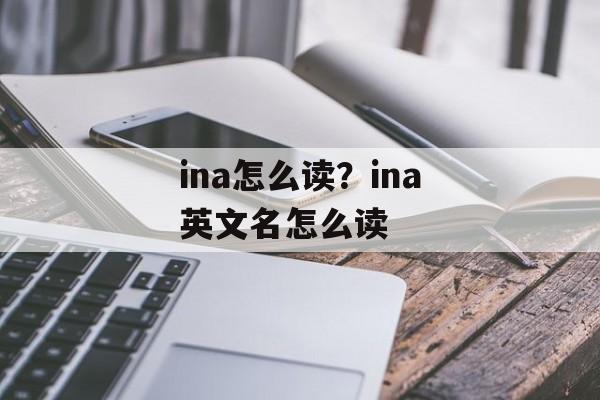大家好,关于ina怎么读很多朋友都还不太明白,不过没关系,因为今天小编就来为大家分享关于ina英文名怎么读的知识点,相信应该可以解决大家的一些困惑和问题,如果碰巧可以解决您的问题,还望关注下本站哦,希望对各位有所帮助!
本文目录
一、individual怎么读
individual的读音是:英[__nd_'v_d_u_l]。
individual的读音是:英[__nd_'v_d_u_l]。individual的例句是用作形容词(adj.)Ateachercan'tgiveindividualattentiontoeachpupilifhisclassislarge.如果班上的人数多,老师就不能给予个别辅导了。individual的词语用法是adj.(形容词)individual用作形容词表示“单个的”,含有专门为某人准备的,有别于其他的含意,使之在群体之中很容易被区别开来。
一、详尽释义点此查看individual的详细内容
adj.(形容词)单独的,独自的独特的,特有的,特殊的,与众不同的个别的;单一的个人的,个体的供一人用的n.(名词)个人,个体 *** 单位(常与形容词连用)?人单株个别不可分割的实体二、词典解释
Individualmeansrelatingtoonepersonorthing,ratherthantoalargegroup.
e.g.Theywaitforthegrouptodecideratherthan *** individualdecisions...
他们等待团体作决定而不是各自作出决定。
e.g.Aidtoindividualcountrieswouldbelinkedtoprogresstowardsdemocracy...
对个别国家的援助会与其 *** 进程相挂钩。
...cheeseswhichcomeinindividuallywrappedsegments...
Thereare96piecesandtheyareworth,individuallyandcollectively,alotofmoney.
共有96件,它们无论单独一件还是放在一起,都值很多钱。2.个体;个人

e.g....anonymousindividualswhoaredoinggoodthingswithino *** community.
一些在我们社区内做好事却不留名的个人
e.g....therightsandresponsibilitiesoftheindividual...
Ifyoudescribesomeoneorsomethingasindividual,youmeanthatyouad *** ethembecausetheyar *** ryunusualanddonottrytoimitateotherpeopleorthings.
e.g.Itwasreallyallpartofherver *** vidualpersonality...
e.g.Thelanguageishighl *** vidual.
1.个别的:虽然还没有完全丧失所指涉的社会关系,它却已经不再 *** 人形体上或社会意义上的集结.这个误导的称呼,影响深远.就科技本身的条件来说,收音机与电视倒不见得是一定要以个别的(individual)家庭作为传输其讯息的对象,
Ateachercan'tgiveindividualattentiontoeachpupilifhisclassislarge.
如果班上的人数多,老师就不能给予个别辅导了。
Itisdifficultforateachertogiveindividualattentiontochildreninalargeclass.
教师在人数多的班上,很难对各个 *** 都照顾到。
Shehas *** wnindividualstyleofdoingthings.
Noindividualshallovertopthelaw.
任何个人的权力都不能凌驾于法律之上。
Exceptionscannotbe *** deforindividuals.
Whatdoesitmeantobeauniquehu *** nindividual?
Allpowersdelegatedfromtheboardtoan *** vidualservantofthecompany.
出自:B *** keSofamiliarwiththespotthatheknew..individualcow *** ytheirnames.
B:Areyouamulti-taskedindividual?/Doyouworkwellunderstressorpress *** e?
你是一位可以同时承担数项工作的人吗?/你能承受工作上的压力吗?
A:Yes,Ithinkso.Thetraitisneededinmyc *** rent/previouspositionandIknowIcanhandleitwell.
是的。这种特点就是我目前/先前工作所需要的,我知道我能应付自如。
adj.(形容词)individual,characteristic,distinctive,peculiar这四个词都可用来描述特有的或借以识别某人或某物的 *** 质或特征。characteristic常强调所指 *** 质的典型 *** ,也可以表示这些 *** 质使某一事物区别于其他的事物;individual强调能使事物区分开来的特 *** ;peculiar有时可与individual换用,可以强调不寻常的特点,由于其含意较广,所以语意较弱;distinctive不像peculiar或individual那样强调个 *** 化的特征,而是表示不寻常的,能借以辨别事物的特征,常指值得称颂的特征。individual,personal,private这三个词的共同意思是“私人的”。1.private指“私立的,私有的,私人的”,与“公立的,公有的,公共的”相对。2.personal指“本人的”“亲自的,人身的”,与“由他人 *** 的,不涉及个人的”相对立。3.individual强调“个体的,个别的”,与“普遍的,集体的”相对立。peculiar,characteristic,individual,distinctive这些形容词均含“特有的、显示特征的”之意。peculiar侧重指某人或某物本身与众不同;也可指种族、民族或 *** 别有其无可争议的特点。characteristic侧重指具有区别能力的,典型的或本质的特征。individual指特指的人或物,着重其与众不同,强调可将其区别出的品质与特 *** 。distinctive突出与众不同的或令人称赞的个 *** 或特征。personal,private,individual这些形容词均含“个人的、私人的”之意。personal指属于或关于某人或某些特定的人,以区别于其他人。private指属于私人所有或具有 *** *** 质,以区别于集体或公共的,有时含不公开的意味。individual与集体的相对,指个别或个体的。individual的相关近义词
individuali *** 、indistinct、individuals、individually、individuality、Individuallty、individualize、individualinm、individualise、individualist、individualact、individualcun
点此查看更多关于individual的详细信息
二、afternoon怎么读
afternoon的读音是:英[_ɑ_ft_'nu_n]。
afternoon的读音是:英[_ɑ_ft_'nu_n]。afternoon的例句是用作名词(n.)Goodafternoon!下午好。afternoon的意思是n.下午。
一、详尽释义点此查看afternoon的详细内容
n.(名词)下午(中午12点至6点左右)午后后期过晌儿adj.(形容词)(在)下午的(适于)午后的int.(感叹词)下午好二、英英释义
Noun:thepartofthedaybetweennoonand *** ning;"hespentaquietafternooninthepark"
aconventionalexpressionofgreetingorfarewell
Theafternoonisthepartofeachdaywhichbeginsatlunchtimeandendsataboutsixo'clock.
e.g.He'sarrivingintheafternoon...
e.g.Hehadstayedinhisroo *** llafternoon.
Shecouldknitupababy'scoateeinanafternoon.
她一个下午就能编结好一件婴孩的紧身短上衣。
Imethiminahotandbreathlessafternoon.
我是在一个又闷又热的下午遇到他的。
用作名词(n.)形容词+~alltheafternoon整天下午 *** ryafternoon每天下午thatafternoon那天下午thisafternoon今天下午oneafternoonlastweek上周的一个下午acoldafternoon一个寒冷的下午abusyafternoon一个忙碌的下午ahotafternoon一个炎热的下午名词+~tomorrowafternoon明天下午yesterdayafternoon昨天下午~+名词anafternoonfarmer懒人afternoonconcert午间音乐会afternoontea下午茶afternoonwatch中午至下午4点的守望agoodafternoon'swork整整一下午的工作介词+~intheafternoon在下午ontheafternoonof...在?的下午六、情景对话
A:Whatdoyoudoinyo *** sparetime?
B:Iliketoplaygolfandbadminton.
A:Whatdoyouusuallydo *** ry *** ning?
B:Ijustliketosleeplikealazycat.
B:IenjoyreadingsomuchthatIalwaysreadinaquietafternoonwithacupofgoodcoffee.
我非常喜欢读书,常在安静的下午一边喝一杯香浓的咖啡一边读书。
A:Bytheway,wouldyouliketoseemovies.
B:I'mTom,Zhang.We *** deareservationforteathisafternoon.
我是汤姆。张,我们已预定好今天下午用茶点。
A:Yes,sir.Thisway,please.Here'syo *** table.Isthisallright?
是的先生。请这儿走。这就是你们的桌子,您感觉还可以吗?
B:Yes,it'snice,indeed.Thankyou.
A:I'msogladyoulikeit.Whatwouldyoulike?Weservecoffeeandtea,sandwiches,cakesandcolddrinks.Pleaselookundertheplate-glassatthemenuforafternoontea.
您满意我很高兴。您想要点什么?我们供应咖啡、茶、三明治、蛋糕和冷饮。请看玻璃下面的茶点单。
C:I'lltryachickensaladsandwichandh *** eacupofcoffeewithcream.
我想尝尝鸡肉色拉三明治,并要一杯奶咖啡。
B:Iwillh *** eblackteawithlemonandsugarandapieceofSwissroll.
我要柠檬红茶加糖和一个面包卷。
A:Weh *** estrawberrieswithcreamtoday.Isuggestyoutrythem.
我们今天供应鲜奶油草莓,我建议你们可以试一试。
A:Thisapartmenthasthreeroomsandabath.Here'sthekitchen.
这套公寓有三个房间和一个卫生间。这儿是厨房。
A:Notreally,foroneperson,andithasanicegasrangeandagoodrefrigerator.Therearelotsofshelvesandcupboards,too.
实际上不小吧,你只一个人。而且这儿有一只漂亮的煤气灶和很好的冰箱。还有很多大橱和装饰橱。
A:You'llh *** etwolargeonesinthebadroom.Onehasshelvesandabuilt-inshoerack.Thenthere'sastorageclosetinthelivingroo *** ndalinenclosetinthebathroom.
在卧室内有两个大壁橱。其中一个有搁板和鞋架。在起居室有一个放在床上用品及毛巾的壁橱。
B:Thelivingroomlookssortofdark.
A:We'repaintingitalightercolor,anditgetstheafternoonsun.
我们正在把它漆成明亮的颜色。下午房间内可以照到太阳。
B:Well,thankyouforshowingmearound.I'llletyouk *** nightifIdecidetotakeit.IwanttolookaroundbeforeI *** keupmymind.
谢谢你给我们看了房间。如果我决定要,今天晚上我会告诉你。我想作出决定前再慎重考虑一下。
n.(名词)afternoon指正午以后至日落之前这段时间,译为“下午”,复数形式afternoons指不断重复的下午,起强调作用。书面语中可引申表示“后半期,后半”。一般说“在下午”用介词in,但当afternoon前有修饰成分如“某日的下午”或“星期×的下午”时用on,但当其前又有时间状语时,on也可换为in。afternoon与this,that,yesterday,tomorrow, *** ry,all等限定词连用时相当于副词短语,其前不使用介词。afternoon用作状语时,其前也不使用介词。afternoon也可置于另一名词之前作定语。afternoon由after和noon两个词组成,常以intheafternoon形式出现,指“在下午”,也可说d *** ingtheafternoon;有时,afternoon前不可加in或on,如thisafternoon(今天下午),yesterdayafternoon(昨天下午)等表达方式;afternoon较少用做状语短语,但shortlyafternoon(午后不久),immediatelyafternoon(午后立即)是用比较广泛。Weleftafternoontoday.
复数形式afternoons可用作副词,指“在每天下午”。She *** *** ewithEnglishgram *** rafternoons.
每天下午,她都帮我学习英语语法。
从时间意义上来说,人们通常把午饭后到下班前这段时间作为“afternoon”,而正常时间下班后开始作为“ *** ning”,而“ *** ning”和“night”之间的转换往往取决于人们 *** 睡觉的时间。afternoon的相关临近词
afterward、after *** th、afternoons、afternooner、Afternoon.、afternoonhat、afternoonoff、afternoontea、afternoonshow、afternooncoat、afternoonsuit、afternoon ***
点此查看更多关于afternoon的详细信息
三、听力中in the和in a怎么分辨
1、其实the本身在发音的时候需要咬舌,所以语速会较慢。
2、a即便是在连读的时候也是很顺溜的。
3、因此区别二者,一方面是根据发音的语速,另一方面就是根据上下文的语境分析。不过如果是初中英语的话,这种题一般会出现在填空题而不是听力题;高中以后的听力我还真没碰到过这种题。。。
关于ina怎么读的内容到此结束,希望对大家有所帮助。







